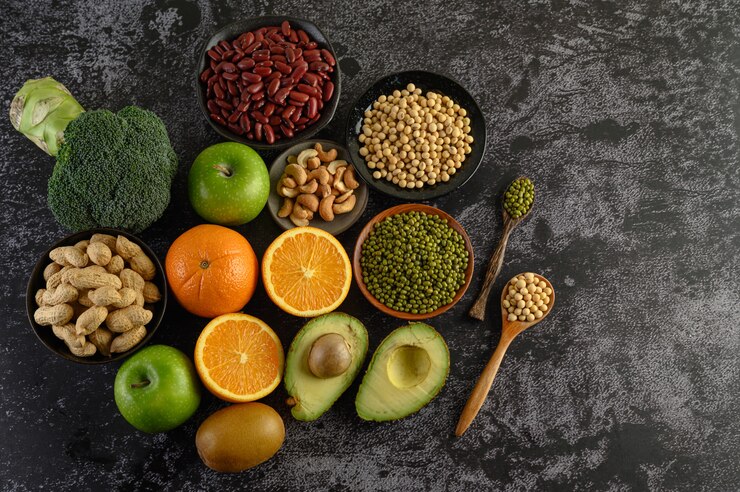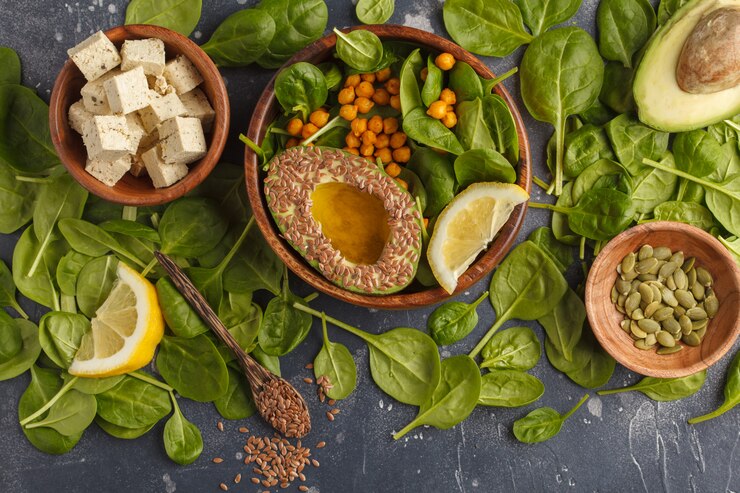Top Foods for Brain Health in Ayurveda

Key Takeaways
- Ayurveda offers a holistic approach to enhance brain health, focusing on natural practices and foods to support cognitive function and mental clarity.
- Traditional Ayurvedic foods, such as nuts and spices, have been used for centuries to improve memory and focus.
- Spices like turmeric and saffron are not only flavorful but also play a key role in enhancing memory and brain health in Ayurveda.
- Herbs such as Ashwagandha and Brahmi are celebrated in Ayurveda for their ability to boost cognitive function and mental performance.
- Incorporating Ayurvedic brain foods into daily meals is practical and beneficial, offering lasting health benefits and improved cognitive well-being.
Ayurveda, an ancient system of medicine, offers a natural approach to nurturing your brain. By focusing on balance and harmony, Ayurveda suggests foods that can sharpen your mind and boost memory. This traditional wisdom connects the body, mind, and spirit to enhance overall well-being. In this article, we'll explore the best food for brain Ayurveda, diving into brain-boosting foods and memory-enhancing Ayurveda secrets. Stay with us to discover how these time-tested practices can support your cognitive health and keep your brain in top shape. Let's embark on this journey to unlock the potential of your mind.
स्वयं दवा न लें और प्रतीक्षा न करें। अभी डॉक्टर से चैट शुरू करें
Top Brain-Boosting Foods in Ayurveda
Ayurveda, the ancient Indian system of medicine, offers a treasure trove of foods known to boost brain health. Ghee, or clarified butter, often tops the list. Rich in omega-3 fatty acids, it supports cognitive function and memory. Another powerful food is turmeric, with its active compound curcumin, known for its anti-inflammatory properties. Ashwagandha, a popular herb, helps reduce stress and anxiety, enhancing mental clarity.
Leafy greens like spinach and kale are also highly valued in Ayurveda for their nutrient density. They provide essential vitamins and minerals that support brain function. As the famous Ayurvedic practitioner Dr. Vasant Lad once said,
"Food is the essence of life, and the right food is the key to happiness."
- Dr. Vasant Lad
Incorporating these foods into your diet can be a delightful journey toward better brain health.
The Role of Spices in Memory Enhancement
Spices have been a cornerstone of Ayurveda, known for their ability to support brain health. Turmeric, for example, contains curcumin, which has been shown to improve memory and cognitive function. This spice is often used in traditional Indian cooking and is valued for its anti-inflammatory properties. A study in the American Journal of Geriatric Psychiatry found that curcumin improved memory and attention in adults over 18 months.
Incorporating turmeric into your diet can be as simple as adding it to soups, stews, or even smoothies. Another powerful spice is cinnamon, which can help improve memory and brain function. Cinnamon has been shown to slow down cognitive decline by reducing inflammation in the brain.
For a practical approach, try sprinkling cinnamon on your morning oatmeal or coffee. Beyond these examples, cardamom and saffron also play a role in memory-enhancing Ayurveda. Cardamom is known for its antioxidant properties, while saffron is praised for its ability to boost mood and memory.
Including these spices in daily meals not only enhances flavor but also supports mental sharpness. This approach aligns with Ayurvedic principles, which emphasize natural remedies for maintaining health.

Herbs That Support Cognitive Function
Herbs have been celebrated in Ayurveda for their role in boosting brainpower. Some plants stand out in their ability to enhance memory and cognitive abilities. One such herb is Brahmi, which has been used for centuries. Brahmi is known for its potential to improve memory retention and support concentration.
Research has shown that Brahmi may reduce anxiety, providing a calming effect that helps the mind focus better. A study published in the "Journal of Alternative and Complementary Medicine" found that Brahmi extract significantly improved memory recall in adults. This makes it a valuable addition to a person's diet who wants to stay sharp and attentive.
Another herb worth mentioning is Ashwagandha. Often referred to as an adaptogen, Ashwagandha helps the body cope with stress. Stress can negatively impact cognitive function, so reducing stress can indirectly improve brain health. Ashwagandha has also been associated with reducing inflammation and oxidative stress in the brain, contributing to its memory-enhancing properties.
Gotu Kola is another fascinating herb used in Ayurveda. It's known for its ability to support mental clarity and improve circulation to the brain. Improved circulation can help enhance cognitive functions, making Gotu Kola a popular choice for those seeking mental sharpness.
Turmeric, with its active compound curcumin, is also a noteworthy mention. Curcumin has anti-inflammatory properties and has been studied for its potential to improve mood and memory. According to some studies, curcumin might even play a role in reducing the risk of Alzheimer's disease, making it a powerful herb for cognitive health.
Incorporating these herbs into your daily routine can be a simple yet effective way to support brain function. Whether through teas, supplements, or dietary additions, these natural remedies can offer significant benefits to your cognitive well-being.

Incorporating Ayurveda into Daily Diet
Bringing the wisdom of Ayurveda into your daily meals can feel like inviting an old friend into your home. It's about listening to what your body needs and choosing foods that support your mind. Start by adding brain-boosting foods Ayurveda recommends, like nuts, seeds, and leafy greens. These are not just tasty but help keep your brain sharp and focused.
Think about including spices and herbs known for their memory-enhancing Ayurveda properties. Turmeric, with its active compound curcumin, is a great place to start. It not only adds flavor but is believed to support brain health. Cooking with these spices can turn a simple meal into a healing experience.
Hydration is key, too. Drinking enough water and herbal teas can help maintain mental clarity. Consider sipping on warm teas infused with ginger or basil. These small changes can make a big difference in how you feel each day.
Making these choices can seem overwhelming, but start small. Perhaps try one new ingredient each week. Pay attention to how your body and mind respond. This journey is personal, and every step forward is a step towards better health.
As you explore the connection between food and brain health through Ayurveda, we invite you to share your experiences. Let's learn from each other. Share this article with friends who might be curious. Engage in the conversation by leaving comments or questions. We’re here to support each other on this path to a healthier mind and body.
FAQ For Brain Health
What makes Ayurveda a suitable choice for improving brain health?
Ayurveda is a holistic system of medicine that focuses on balancing the mind, body, and spirit. It uses natural remedies and dietary practices to enhance brain health, which can lead to improved cognitive function and mental clarity.
What are some top brain-boosting foods recommended in Ayurveda?
Ayurveda recommends foods like almonds, walnuts, ghee, whole grains, and leafy greens for boosting brain health. These foods are rich in essential nutrients that support memory and concentration.
How do spices contribute to memory enhancement in Ayurveda?
Spices like turmeric and saffron are known for their anti-inflammatory and antioxidant properties. They help protect brain cells and improve memory by reducing oxidative stress and promoting healthy brain function.
Which Ayurvedic herbs are known to support cognitive function?
Ayurvedic herbs such as Ashwagandha, Brahmi, and Gotu Kola are renowned for their cognitive-enhancing properties. These herbs help in reducing stress, improving focus, and enhancing overall mental performance.
Can you provide tips for incorporating Ayurvedic brain foods into my daily diet?
To include Ayurvedic brain foods in your diet, start by adding nuts and seeds to your breakfast, using spices like turmeric in your cooking, and incorporating leafy greens into your meals. You can also try herbal teas made with Brahmi or Ashwagandha for added benefits.
Are there specific dietary practices in Ayurveda for maintaining long-term brain health?
Yes, Ayurveda emphasizes eating whole, unprocessed foods, maintaining a balanced diet, and following regular meal times. Eating according to your body's constitution (dosha) is also crucial for sustaining long-term brain health.
How soon can one expect to see benefits from following an Ayurvedic diet for brain health?
The benefits of an Ayurvedic diet can vary depending on individual health conditions and adherence to the dietary practices. Generally, improvements in mental clarity and focus can be noticed within a few weeks, but long-term benefits require consistent practice.
कोई और प्रश्न हैं?
आयुर्वेदिक डॉक्टर से एक प्रश्न पूछें और मुफ़्त या सशुल्क मोड में अपनी चिंता की समस्या पर ऑनलाइन परामर्श प्राप्त करें।
2,000 से अधिक अनुभवी डॉक्टर हमारी साइट पर काम करते हैं और आपके प्रश्नों की प्रतीक्षा करते हैं और प्रतिदिन उपयोगकर्ताओं को उनकी स्वास्थ्य समस्याओं को हल करने में मदद करते हैं।

